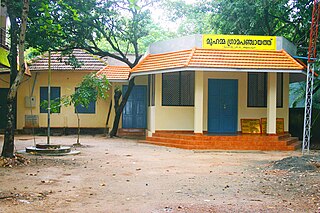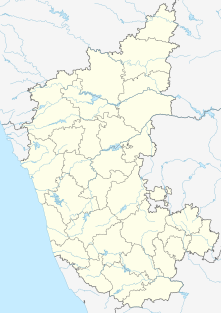India is the second most populated country in the world with nearly a fifth of the world's population. According to the 2019 revision of the World Population Prospects the population stood at 1,352,642,280.

Vijayadashami also known as Dussehra, Dasara or Dashain, is a major Hindu festival celebrated at the end of Navaratri every year. It is observed on the tenth day in the Hindu calendar month of Ashvin, the seventh month of the Hindu Luni-Solar Calendar, which typically falls in the Gregorian months of September and October.

Alluri Seetarama Raju was an Indian revolutionary involved in the Indian independence movement. After the passing of the 1882 Madras Forest Act, its restrictions on the free movement of tribal people in the forest prevented them from engaging in their traditional podu agricultural system, which involved shifting cultivation. Alluri led the Rampa Rebellion of 1922, during which a band of tribal people and other sympathisers fought in the border areas of the East Godavari and Visakhapatnam regions of Madras Presidency, in present-day Andhra Pradesh, against the British Raj, which had passed the law. He was referred to as "Manyam Veerudu" by the local people.
A gram panchayat or village panchayat is the only grassroots-level of panchayati raj formalised local self-governance system in India at the village or small-town level, and has a sarpanch as its elected head.
The administrative divisions of India are subnational administrative units of India; they compose a nested hierarchy of country subdivisions.
A sarpanch or pradhan or mukhiya is a decision-maker, elected by the village-level constitutional body of local self-government called the Gram Sabha in India. The sarpanch, together with other elected panchayat members, constitute the gram panchayat. The sarpanch is the focal point of contact between government officers and the village community and retains power for five years.

Panchayati Raj is the system of local self-government of villages in rural India as opposed to urban and suburban municipalities.
Ramapur village and post, or Rama Pur as it is known for postal purposes, is a village-gram panchayat in Pawai Block, Phulpur, Azamgarh, Uttar Pradesh, India. The inhabitants of the village follow Lord Rama and Sita in whose honor this village name was kept Ramapur in ancient days. This village has an internal relationship with Bishunpur, Jaunpur in a well defined religious and social perspective.

RannaBelagali is a Pattan Panchayat Town in the southern state of Karnataka, India. It is located in the Mudhol taluka of Bagalkot district in Karnataka

Dhavaleshwar is a village in the southern state of Karnataka, India. It is located in the Mahalingpur taluk of Bagalkot district in Karnataka. Dhavaleshwar is located on the bank of Ghataprabha river. The river bifurcates the Belgaum and Bagalkot districts. Just on the other side of the river, there is one more village which, is also known as Dhavaleshwar. This Dhavaleshwar belongs to Gokak Taluk of Belgaum district. Many politicians promised to build a bridge between both villages, but no one has initiated. The villagers grow sugar cane, which is the source of their income.

Mantur is a village in the southern state of Karnataka, India. It is located in the Mudhol taluk of Bagalkot district in Karnataka.

Hulagabali is a village in the southern state of Karnataka, India. It is located in the Athani taluk toward north-east of Belgaum district. The basic occupation in Hulagabali is agriculture and there are also many landlords in the village who are famous in agriculture. Sugarcane is the highest percentage of agriculture as per the survey. There are quite a few temples in the village. The Birappa temple located in this village is well known in surrounding villages. Birappa temple has a large fair and festivities twice a year that draws huge crowd in the region. Sri Sangameshwara temple stands at the juncture of River Krishna and River Agrani. The famous landlords are Patil (Gouda).

Mamadapur is a village in the southern state of Karnataka, India. It is located in the Gokak taluk of Belgaum district in Karnataka. It is the birthplace of Wrangler D.C. Pavate

Uchagaon (उचगाव) is a village in the southern state of Karnataka, India. It is located in the Belgaum taluk of Belgaum district in Karnataka. Last village on the way towards maharastra.
A tehsil is an administrative division in some countries of the Indian subcontinent that is usually translated to "township". It is a subdistrict of the area within a district including the designated city, town, hamlet, or other populated place that serves as its administrative centre, with possible additional towns, and usually a number of villages. The terms in India have replaced earlier geographical terms, such as pergunnah and thana.

Karajagi is a village in jath, in the state of Maharashtra]], India. It is located in the jath taluk of sangli district.
Ingalagi is a panchayat village in Belgaum district in the southern state of Karnataka, India.

The Panchayat raj (panchayat "village council", raj "rule") is a political system, originating from the Indian subcontinent, found mainly in India, Pakistan, Bangladesh, Sri Lanka, and Nepal. It is the oldest system of local government in the Indian subcontinent, and historical mentions date to the 250 CE period. The word raj means "rule" and panchayat means "assembly" (ayat) of five (panch). Traditionally panchayats consisted of wise and respected elders chosen and accepted by the local community. However, there were varying forms of such assemblies. Traditionally, these assemblies settled disputes between individuals and between villages.

Mankoo is a village in Jalandhar district of Punjab State, India. It is located 30 kilometres (19 mi) from district headquarter Jalandhar and 156 kilometres (97 mi) from state capital Chandigarh. The village is administrated by a sarpanch who is an elected representative of village as per Panchayati raj (India).






